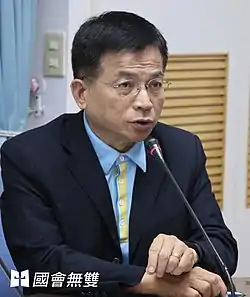Lai Shyh-bao
Lai Shyh-bao (Chinese: 賴士葆; pinyin: Lài Shìbǎo; born 20 June 1951) is a Taiwanese politician. He has served on the Kuomintang Central Standing Committee, the National Assembly and the Legislative Yuan.[1]
Lai Shyh-bao | |
|---|---|
賴士葆 | |
 Lai at a press conference related to the 2015 Ma–Xi meeting | |
| Minority Leader of the Legislative Yuan | |
| In office 1 February 2016 – 7 July 2016 | |
| Preceded by | Ker Chien-ming |
| Succeeded by | Liao Kuo-tung |
| Member of the Legislative Yuan | |
| Assumed office 1 February 2008 | |
| Constituency | Taipei 8 |
| In office 1 February 1999 – 1 February 2002 | |
| Majority Leader of the Legislative Yuan | |
| In office 7 February 2015 – 1 February 2016 | |
| Preceded by | Alex Fai |
| Succeeded by | Ker Chien-ming |
| Personal details | |
| Born | 20 June 1951 Taipei, Taiwan |
| Nationality | Republic of China |
| Political party | Kuomintang |
| Other political affiliations | New Party |
| Alma mater | National Cheng Kung University, National Chengchi University, University of Southern California |
| Occupation | Politician |
Education
He received a bachelor's degree in engineering from National Cheng Kung University, before studying business administration at the National Chengchi University. Lai taught the subject and eventually chaired the Graduate Institute of Business Administration at NCCU. He returned to engineering while as a master's and doctoral student at the University of Southern California.[1]
Political career
From 1999 to 2002, Lai was a New Party legislator.[2][3] Despite a declaration that he would leave the New Party at the end of 2001 but not join another party,[4] Lai switched affiliations to the Kuomintang in his legislative second term and secured the continued endorsement of the New Party.[5]
Lai was also promoted to increasingly important KMT caucus positions. In April 2005 he was deputy secretary of the caucus.[6] By July, Lai had become caucus whip,[7] a position he held until February 2016.[8] Lai was nominated as the Kuomintang candidate for speaker of the ninth Legislative Yuan.[9] The Democratic Progressive Party held a majority in the legislature, and elected Su Jia-chyuan as President of the Legislative Yuan. In 2020, Lai was again nominated for the speakership, losing for a second time, to Yu Shyi-kun.[10]
Electoral history
2008 legislative election
- Eligible voters: 231,411
- Total votes cast (Ratio): 146,614 (63.36%)
- Valid Votes (Ratio): 145,173 (99.02%)
- Invalid Votes (Ratio): 1,441 (0.98%)
| No. | Candidate | Party | Votes | Ratio | Elected |
|---|---|---|---|---|---|
| 1 | Mei Fong (梅峰) | 171 | 0.12% | ||
| 2 | Ren Li Min (任立民) | 234 | 0.16% | ||
| 3 | Chou Po-ya (周柏雅) | Democratic Progressive Party | 38,261 | 26.36% | |
| 4 | Lai Shyh-bao | 104,257 | 71.81% | ||
| 5 | Shih Mei Yan (史美延) | Third Society Party | 492 | 0.34% | |
| 6 | Fang Ying Jyun (方景鈞) | 277 | 0.19% | ||
| 7 | Peng Yan Wun (彭渰雯) | 1,481 | 1.02% |
References
- "Lai Shyh-bao". Legislative Yuan. Retrieved 17 January 2016.
- Her, Kelly (1 August 2001). "Hard Times". Taiwan Today. Retrieved 29 January 2016.
- Low, Stephanie (7 April 2001). "Legislators want action taken on stalled graft bill". Taipei Times. Retrieved 29 January 2016.
- Low, Stephanie (9 December 2001). "New Party strengthens its resolve to make a fresh start". Taipei Times. Retrieved 12 November 2016.
- Ko, Shu-ling (1 February 2005). "Wang-Chung ticket set to secure speakers' posts". Taipei Times. Retrieved 27 January 2016.
- Su, Joy (16 April 2005). "Disclose 'secret deal,' DPP demands". Taipei Times. Retrieved 27 January 2016.
- Ko, Shu-ling (30 July 2005). "Hsieh fails to sway opposition legislators". Taipei Times. Retrieved 27 January 2016.
- Hsu, Stacy (27 January 2016). "KMT nominates speaker candidates". Taipei Times. Retrieved 27 January 2016.
- Chen, Chun-hua; Liu, Kay (31 January 2016). "Legislature set to enter new era when new term begins Monday". Central News Agency. Retrieved 31 January 2016.
- Chen, Chun-hua; Yeh, Joseph (1 February 2020). "DPP's You elected legislative speaker (update)". Central News Agency. Retrieved 1 February 2020.
| Wikimedia Commons has media related to Lai Shih-bao. |